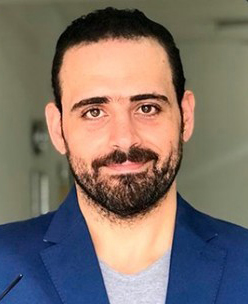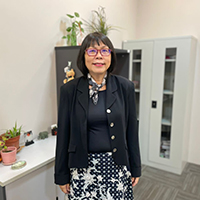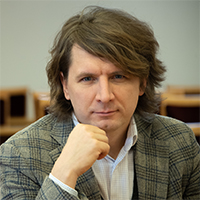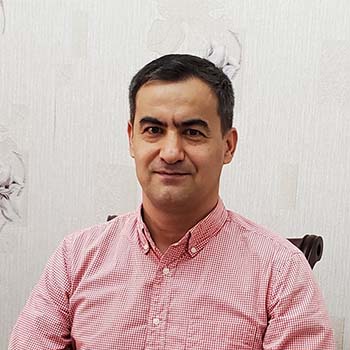
|
Asst. Prof. Hassan Abuhassna
Universiti Teknologi Malaysia (UTM), Malaysia
|
|
Dr. Hassan Abuhassna is an Assistant Professor at Universiti Teknologi Malaysia (UTM) with expertise in educational technology. His academic journey began at UTM, where he spent three years as a Research Assistant, followed by a six-month postdoctoral fellowship, and a brief stint as a part-time instructor. Dr. Abuhassna holds a Ph.D. in Philosophy with merit, specializing in Educational Technology, and a Master's degree in Instructional Technology. His research interests center around online education, particularly Massive Open Online Courses (MOOCs) and electronic learning (e-learning). Dr. Abuhassna has made significant contributions to the field, with his work indexed in prestigious databases like Web of Science (WoS) and Scopus. He continues to shape the future of online education through his dedication to innovative pedagogical approaches and remains a key figure in the academic community at UTM. |
|

|
Dr. Ali Sorayyaei Azar
Management and Science University (MSU), Malaysia
|
|
Dr. Ali Sorayyaei Azar is a senior lecturer at the Department of Education, School of Education and Social Sciences, Management & Science University (MSU). He got his Ph.D. (in Applied Linguistics) from Faculty of Languages and Linguistics, University of Malaya, Malaysia in 2017. In a career spanning 26 years, he has worked as an EFL/ESL senior lecturer, researcher, and curriculum developer in Iran, Turkey, Qatar, and Malaysia. He has published and presented research papers on his interest topics namely TESL, Academic Discourse Analysis, Genre Analysis, Corpus Linguistics, Educational Technology, and English Language Teaching Strategies in several prestigious journals including GEMA Online@ Journal of Language Studies (UKM, Malaysia), Asian ESP Journal, Asian EFL Journal, Studies in English Language and Education, World Journal of English Language, and Education and Information Technologies (Springer). He is the Guest Editor of Journal of Intercultural Communication, indexed in Scopus- Q2 (https://www.immi.se/intercultural). He has also been appointed as one of the International Advisory Board Members of the International Journal of Modern Languages and Applied Linguistics (IJMAL), established by by Akademi Pengajian Bahasa (APB), Universiti Teknologi MARA, ShahAlam, Malaysia. |
|

|
Prof. Nee Nee Chan
UCSI University, Malaysia
|
|
Thought-provoking speaker, researcher, and
teacher, Professor Chan inspires others to think critically about their
actions and reflect on their work. As an invited speaker to conferences and
seminars, Nee Nee's highly interactive style enables her to make meaningful
connections with her audience.
Speech Title: Investigating the Adoption
of Generative Artificial Intelligence (AI) in Universities: Southeast Asian
(SEA) University Instructors' Perspectives of the AI Tidal Wave Abstract: With the public release of ChatGPT in November 2022, the initial response to Generative Artificial Intelligence (GenAI) among the academic community has ranged from euphoria to hysteria. Within this conflicted landscape of opinions, there appears to be a scarcity of empirical studies on GenAI use and its impact on teaching and learning, assessment and research practices. This talk will share the findings of SEA university instructors' experiences of GenAI use for academic purposes, by themselves, their colleagues, and their students. Hermeneutic phenomenology was used as the framework of this study for its philosophical principles and research methodology. 10 focus groups of 37 university instructors were interviewed using hermeneutic phenomenological protocols. The findings uncovered the lack of guidance on day-to-day academic practices that involve plagiarism, excessive use of AI in assignments and uncertainty on penalties for such infringements. These findings suggest an urgent need for a more sustainable and coherent AI policy in SEA universities today. |
|
|
|
Dr. Zuheir N Khlaif
An-Najah National University, Palestine
|
|
Dr. Zuheir N Khlaif holds Ph.D. in instructional design and technology. He is a distinguished scholar and researcher at An-Najah National University in Palestine. As a dedicated educator, he imparts knowledge in educational technology courses and contributes significantly to the Artificial Intelligence and Virtual Reality Research Center at the University. With a keen focus on the intersection of technology and education, his research delves into areas such as technology integration, technostress, and the application of AI in educational assessment. Khlaif has delivered more than 50 lectures and workshops about e-learning and AI in higher and public education at international and local conferences and symposiums.
Speech Title: Harnessing the Power of AI
for Transformative Learning in Conflict Zones Abstract: We will explore the transformative potential of artificial intelligence (AI) in enhancing learning outcomes in Palestine as a conflict zone. The unique challenges posed by Palestine these days, such as limited access to quality education, the closure of higher education institutions and public schools, disrupted learning environments, and psychological trauma, necessitate innovative solutions. We argue that AI-powered educational technologies can provide personalized learning experiences, adapt to the diverse needs of students, and offer scalable interventions. By harnessing the power of AI, we can develop intelligent tutoring systems, language translation tools, and adaptive learning platforms that cater to the specific contexts of conflict-affected areas. Our discussion will highlight a case study demonstrating the impact of AI on improving educational access, engagement, and achievement in these challenging settings. Ultimately, we advocate for a collaborative approach, involving educators, technologists, policymakers, and humanitarian organizations, to leverage AI for transformative learning in Palestine. |
|

|
Dr. Michał Paluch
Cardinal Stefan Wyszynski University, Poland
|
|
Dr. Michał Paluch is an Assistant Professor at
the Department of Philosophy of Education at the Cardinal Stefan Wyszynski
University in Warsaw. In his research, he attempts to link the classic
categories of Western philosophical anthropology (encounter, dialogue,
relationship, self, conscience) with the generative possibilities of
artificial intelligence. He considers these proposals theoretically and
tests them in the practice of pedagogical counseling as part of work on his
own concept of developing "deep competences". The main areas of research on
deep competences are:
Speech Title: Artificial intelligence in
the process of diagnostics and pedagogical counseling: Case studies
|
|

|
Prof. Rustam Shadiev
Zhejiang University, China
|
|
Prof. Rustam Shadiev earned his Ph.D. in Network Learning Technology from National Central University in 2012. He is currently a Tenured Professor at the College of Education, Zhejiang University, Hangzhou, China, specializing in advanced learning technologies for language learning and cross-cultural education. Prof. Shadiev is a Fellow of the British Computer Society and a Senior Member of the Institute of Electrical and Electronics Engineers (IEEE). In 2019, he was honored with the title of Distinguished Professor of Jiangsu Province, China. Further, he has been recognized as one of the most cited Chinese researchers in the field of education by Elsevier, Scopus, and Shanghai Rating for three consecutive years, from 2020 to 2022.
Speech Title: Breaking Boundaries,
Building Bridges: Empowering Cross-Cultural Learning Through Technological
Innovation
Abstract: This speech integrates findings from research on the cutting edge of technology's role in enriching cross-cultural learning experiences. It explores the dynamic ways through which advanced educational technologies-spanning from project-based collaborative platforms in digital environments to immersive virtual reality (VR) and innovative language translation tools-serve as catalysts for intercultural competence among globally diverse participants. The discourse begins by exploring the impact of collaborative cyber communities on enhancing cross-cultural understanding, emphasizing the vital role of educational communication in these settings. Attention is then shifted to the transformative potential of speech-to-text and translation technologies. These tools are scrutinized for their ability to support multilingual dialogue, with a focus on identifying both the accuracy rates of translations and the inventive strategies developed to navigate technological limitations, thereby promoting deeper cross-cultural exchanges. Further investigation is directed towards the immersive experiences afforded by 360-degree video technology within VR environments. This technology is celebrated for its capacity to significantly elevate participants' intercultural competence and engender a profound sense of virtual presence, offering a rich, immersive dive into foreign cultures. Additionally, the speech highlights an innovative application of drone technology for the creation of cultural videos. This method presents a compelling alternative to traditional field trips, particularly in the context of the constraints imposed by the COVID-19 pandemic, thereby enabling continued intercultural engagement and learning. Moreover, the role of speech-enabled corrective feedback technology in tele-collaborative projects is examined for its effectiveness in enhancing intercultural competence. This section delves into how immediate feedback on language use within spoken communication can lead to substantial improvements in intercultural understanding. Collectively, these inquiries illuminate the profound capacity of technology to transcend conventional educational boundaries, offering fresh perspectives and practical strategies for educators and researchers dedicated to cultivating a global mindset and intercultural skills among learners in an increasingly interconnected society. |
|